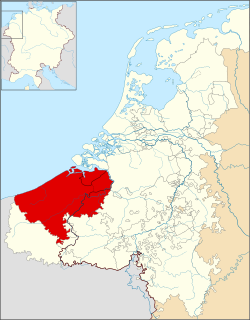Monday, February 12th, 2018...8:37 pm
The Influence of Flemish Trade on the English Language
Jake Decker
While both originating from the language family of Proto-Germanic, Dutch and English have evolved in close proximity to one another for hundreds of years. A surprising amount of loan words exist in the English language originating from Dutch but most of this lexical change happened during the period of Middle-English.
In the Low countries, five major mutually intelligible Dutch dialects existed. Brabantian, Hollandic, Rhinelandic, Limburgish, and Flemish. The Flemish dialect originates from the County of Flanders, a historic territory in the Low Countries.1 During the 12th and 13th century, well into the middle-english period, the cloth trade became dominated by the Flemish from Flanders. Being manufactured in cities such as Ghent and Antwerp, the rising commercial power of the Flemish cloth trade increased the movement from individuals in the Low Countries to England. This allowed for an increased amount of Dutch loan words in the English language. In addition, the abundance of warfare, overpopulation and floods caused even more people to immigrate to England. 2
During this time, loanwords reflecting the notion of trade or transport are in abundance. For example, words such as Beaker or in Dutch beker meaning “cup” or “mug” and Buckwheat or boecweite in Dutch are goods in which would be a product of trade. Pekel, or in modern English, Pickle, is another example of this. Words such as knapsack (knapzak,) Bundle (bondle) and Wagon (waghen) insinuate a notion of transport and to extension of that, words associated with that of a vessel or a ship that would transport goods across what one could assume would be the English Channel. These words include Deck (dec,) Dock (Docke) and Leak (leken.) Interestingly enough, the noun Excise which means a “tax on goods” is also a loan words borrowed from Dutch (excijs.) This perhaps could have been borrowed around the time Edward I severely taxed the cloth trade in England to fund the Hundred Year War. 3
During the period of middle-english, Dutch and English were considered even more similar than they are today. For example, comparing modern Dutch words to their english equivalent proves their similarities. Boek is book, diep is deep and pool is pole. The similarities are not in spelling but that of pronunciation and this because both languages are greatly influenced by French and Latin and evolved in close proximity to each other for hundreds of years. When these Dutch loanwords were brought into the English language, their vowel combinations were then changed to their English counterpart. For example, oe in Dutch corresponds to oo in English or ie in Dutch to the English ee. It is unlikely that the people of the middle English/Dutch period were consciously aware how much the language was changing because it was happening so gradually. With data being lost over the years and the sheer fact that these events are hundreds of years old, it leaves the modern scholar to infer on some data.
It is estimated that about 1% of words in the English language are of Dutch origin and it’s amazing how much of an change exterior parties can influence the fate of a language.
1Van Der Horst, J.M. “The Low Countries.” DBNL. http://www.dbnl.org/tekst/_low001199601_01/_low001199601_01_0023.php
2“Medieval Wool Trade.” Wikipedia. Wikimedia Foundation, 22 Janurary. 2018. https://en.wikipedia.org/wiki/Medieval_English_wool_trade
3“List of English Words of Dutch Origin.” Wikipedia. Wikimedia Foundation, 22 January. 2018. https://en.wikipedia.org/wiki/List_of_English_words_of_Dutch_origin

Comments are closed.